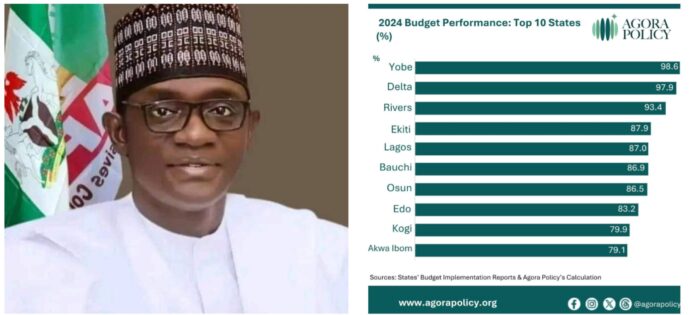By ABDULLAHI INUWA
In a resounding endorsement of fiscal discipline, transparency, and efficient governance, Yobe State has emerged Nigeria’s top budget-performing state in 2024, according to the latest Agora Policy Annual Subnational Budget Performance Report.
With an impressive score of 98.6%, Yobe topped the list of all 36 states, followed closely by Delta and Rivers in second and third place respectively. The milestone is not just a win for the state’s finances—it’s a loud testament to Governor Mai Mala Buni’s quiet revolution in public sector accountability.
“This recognition is an inspiration to achieve more,” said Governor Buni. “We have consistently pursued realistic budgets, and we remain guided by discipline, transparency, and financial prudence.”
Agora Policy, a respected Nigerian policy think tank with a mission to foster democracy, economic development, and good governance, publishes its annual performance report to assess how Nigerian states fare in budget implementation, planning, and fiscal responsibility. The 2024 edition was especially significant, coming in the wake of post-COVID economic shocks and tightening revenue challenges across the nation.
In a country where many subnationals struggle with budget implementation—some lagging at under 50% execution—Yobe’s nearly perfect score is a standout achievement.
The state not only passed the benchmark but surpassed expectations, adhering to the golden rule of budgeting: spend what you can afford and make sure what you spend reflects the needs of the people. From education and healthcare to infrastructure and agriculture, Yobe’s budget priorities were not just drawn on paper—they were implemented on ground.
According to Agora Policy, the state excelled in timely budget preparation, realistic revenue projections, transparent procurement processes, and alignment of expenditure with developmental goals.
“Yobe State stands as a role model of budget credibility and execution,” the report stated. “Its approach combines ambition with fiscal discipline.”
This isn’t the first time Yobe State has earned accolades for its fiscal management. Over the years, the Buni-led administration has cultivated a reputation for financial transparency and good governance.
Notably, Yobe has been a consistent top performer in the World Bank’s State Fiscal Transparency, Accountability, and Sustainability (SFTAS) Programme—a multi-million dollar initiative designed to promote better governance at subnational levels in Nigeria.
The SFTAS ratings consistently ranked Yobe as one of the best in fiscal transparency and sustainability, especially in areas such as citizen budget dissemination, debt management, procurement transparency, and public participation in budget processes.
The achievements also extend to audit efficacy. In 2023 and 2024, the Paradigm Leadership Support Initiative (PLSI)—an internationally recognized civil society organization that tracks audit practices—ranked Yobe as the No. 1 state in audit transparency and accountability.
When Governor Buni assumed office, Yobe was grappling with limited resources, infrastructure deficits, and the aftermath of insurgency. Rather than dwell on challenges, his administration set out with a clear vision: deliver maximum impact with limited resources through honest budgeting and execution.
The governor’s philosophy is simple: a budget is not just a document—it is a contract with the people.
“Budgets should not be overambitious or political,” Buni has often remarked. “They should be practical, transparent, and measurable.”
Under his leadership, Yobe’s budget process was redesigned to engage stakeholders, reflect real-time data, and follow due process in expenditure approvals. This has restored trust in government spending and encouraged donor confidence.
In 2024 alone, the state implemented capital projects across sectors without resorting to unsustainable borrowing. Public procurement was digitized, and budget tracking was made available to civil society and citizens—a move hailed by many as revolutionary in a region often criticized for opacity.
The Agora Policy award is not just a pat on the back—it is a powerful message to other Nigerian states: governance works when transparency leads.
Analysts say Yobe’s example could serve as a blueprint for other subnationals battling to align budgeting with service delivery.
According to public finance expert Dr. Ladi Mustapha, “The Yobe model proves that political will, supported by professional technocrats and open governance, can turn around even resource-constrained states. What Buni is doing is not magic—it’s method.”
The state’s reputation has also attracted attention from development partners and donor agencies, many of whom have resumed or scaled up interventions in health, education, and agriculture in the state.
For the people of Yobe, the results are visible.
Rural roads are being paved, New classrooms and hospitals are being built, and Youth empowerment and women development initiatives are receiving budgeted support, not just promises.
Civil society groups in the state have also commended the government for involving citizens in budget townhalls and making quarterly budget performance reports publicly accessible.
According to Hajiya Amina Bukar, a community leader in Damaturu, “This is the first government where we can see exactly what was promised in the budget and where it’s being done.”
Governor Buni has pledged not to rest on this achievement. “We must build on this recognition. Our goal is not just to be the best in Nigeria, but to set an African benchmark in budgetary performance,” he said.
Already, plans are underway to further digitize Yobe’s budget cycle—from preparation to implementation and monitoring. The state is also exploring performance-based budgeting and expanding citizen engagement platforms.
For many observers, Yobe’s Agora Policy win in 2024 is more than a trophy—it’s a transformation. In a federation where the gap between budgeting and delivery is often wide, one state in Nigeria’s North East is showing that with vision, discipline, and integrity, that gap can be closed.
And if Governor Buni’s administration continues on this trajectory, Yobe may not just retain its top spot—it may become the gold standard in fiscal responsibility and people-centered governance in Nigeria.
Filed from Katsina,this feature is part of a series highlighting innovations in governance across Nigeria.




